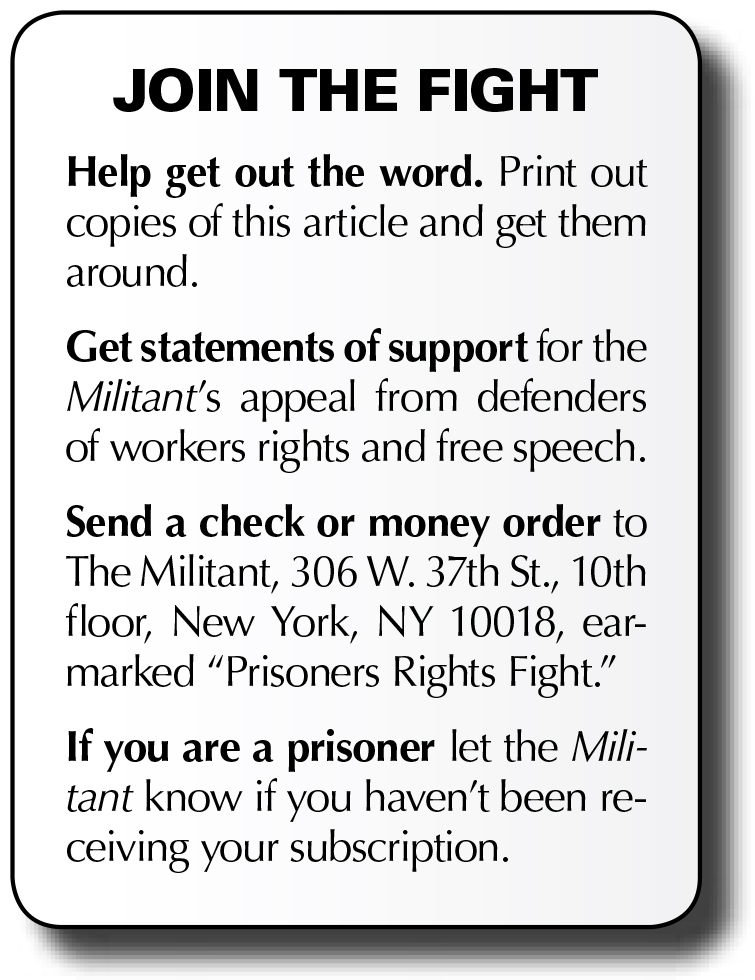

Vol. 77/No. 38 October 28, 2013
On Oct. 11 Benjamin Stevenson, the Florida American Civil Liberties Union attorney representing the Militant, got the news from LaDawna Fleckenstein, assistant general counsel for the Florida Department of Corrections. Previously, prison authorities had informed Stevenson that they had decided in an Oct. 1 meeting to uphold their Sept. 5 decision to impound an issue of the paper reporting on initiation of a hunger strike in California prisons.
“The literature review committee met and held a rehearing of the appeal regarding the decision to impound an issue of The Militant,” Fleckenstein wrote. “The literature review committee decided to overturn their previous decision. The issue of The Militant will be allowed in.”
“We are pleased the Literature Review Committee saw the error in its ways and on its own decided to reconsider and allow the Militant to be distributed to inmates in Florida prisons,” Stevenson told the paper.
The issue was impounded by prison authorities Sept. 5 on the basis that a front page news article in the July 22 issue “encourages hunger strikes.”
Since the fight started, the Militant has been told by inmates in another Florida prison and in Washington state that they also have been denied their subscriptions.
The Florida prisoner, a long-time subscriber, said he hasn’t gotten an issue in over six weeks. The Washington inmate said three issues of the Militant were seized by prison authorities, the one dated July 22 and the next two issues with follow-up articles on the hunger strike.
“We intend to press this fight,” Militant editor Doug Nelson said after hearing about the Florida Corrections Department decision to reverse itself and let the paper into state prisons there. “We are going to challenge efforts by prison authorities to censor the socialist press. We have just started to reach out and win support for this fight, which is a fight in the interests of all working people, inside and outside prison walls, as well as all defenders of basic constitutional rights.”
Censorship of news from prisoners
The Militant has begun to learn about censorship of publications advocating prisoners’ rights or for running articles by prisoners.One of these, the San Francisco Bay View, a nationally-circulated Black newspaper that has printed articles about and by inmates fighting solitary confinement, had a March issue censored at the Pelican Bay State Prison in California — where the hunger strike was initiated — for running an article headlined “Prisoners’ peaceful protest to resume July 8 if demands are not met.”
Before being printed in the Bay View, the article, written by four inmates, was circulated to Gov. Jerry Brown, the state Department of Corrections, the Pelican Bay warden, and forwarded to newspapers throughout the state. The article was covered by numerous television stations, including those broadcast inside the prison. And the authors — Sitawa Nantambu Jamaa, Arturo Castellanos, Todd Ashker and Antonio Guillen — were allowed to circulate the article among each other, which was the only way it could have been written from solitary confinement.
Nonetheless, prison authorities decided to prevent other prisoners from reading the article because it “plans to disrupt the order, or breach the security of any institution.”
In May, the paper ran an article by five inmates — Sondai Dumisani, Abasi Ganda, Mutope Duguma, Abdul O. Shakur and Sitawa Nantambu Jamaa — who formed the Pelican Bay Human Rights Movement First Amendment Campaign to fight the censorship.
“I asked one officer how many times have the L.A. Times, USA Today, Sacramento Bee or Triplicate been mail-stopped?” the First Amendment committee members wrote. “He initially said he didn’t know, but once I pressed him, he said, admittedly, ‘Never.’”
The Bay View was barred, the May article said, because prison authorities “hate the fact that someone would even provide a platform for prisoners to express themselves.”
“The Militant, like our paper, the San Francisco Bay View, has been censored for its coverage of the recent California hunger strike,” Mary Ratcliff, editor of the Bay View, wrote to the Militant. “Because the strike involved 30,000 prisoners at its peak, making it the largest in U.S. history, and lasted 60 days — 40 prisoners having starved themselves that entire time — it is unarguably newsworthy. In California, the press is prohibited by law from visiting prisoners to hear their side of the story, so coverage is limited to statements from prison authorities. Mainstream press coverage, therefore, is not challenged; those newspapers are distributed to prisoner subscribers. Newspapers like the Militant and the Bay View, however, that report from the perspective of peacefully protesting prisoners and their families and supporters are challenged. Our readers, both inside and outside of prison, are entitled to the whole story. Constitutional rights do not stop at the prison gate.”
“We offer our solidarity with the Bay View,” Nelson said. “We are fighting the censorship of our paper to help beat back efforts to deprive any inmate of the news they want. It is an important part of breaking down barriers between prison life and life outside those walls.”

|